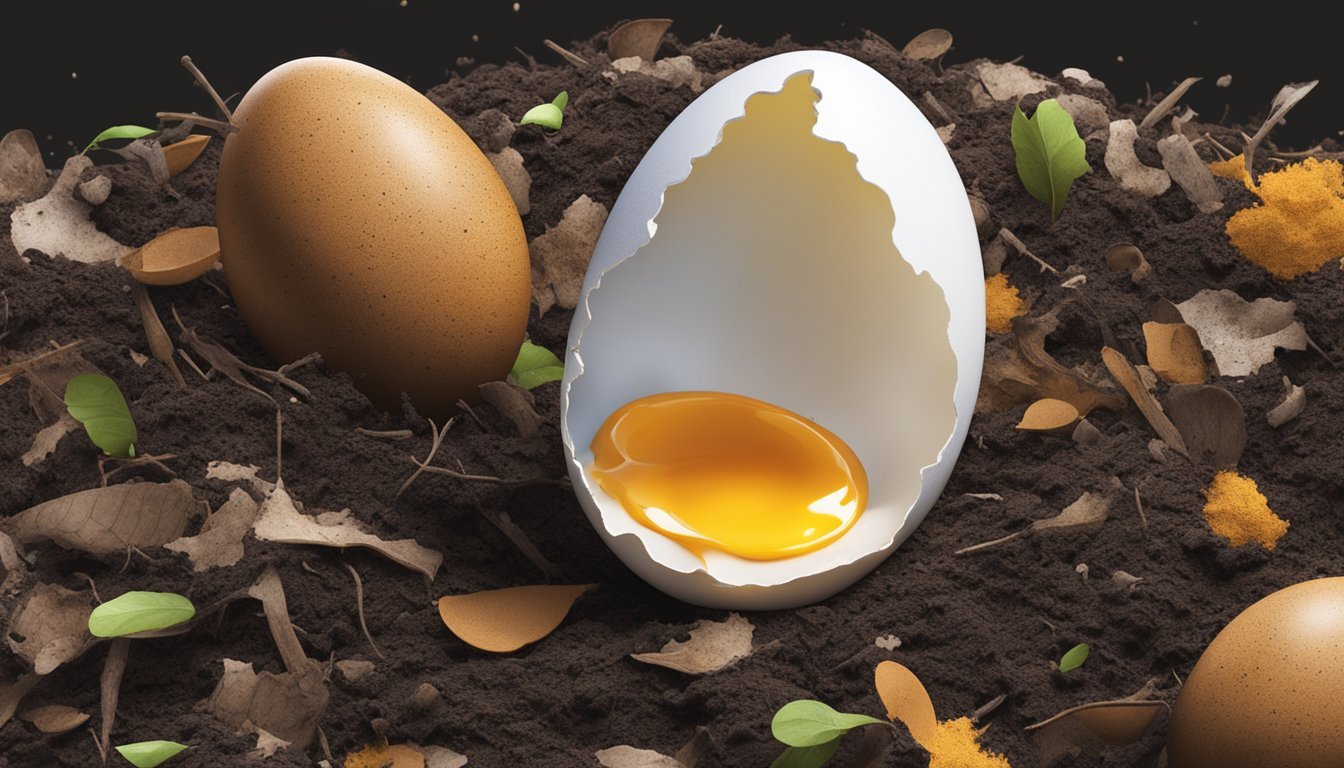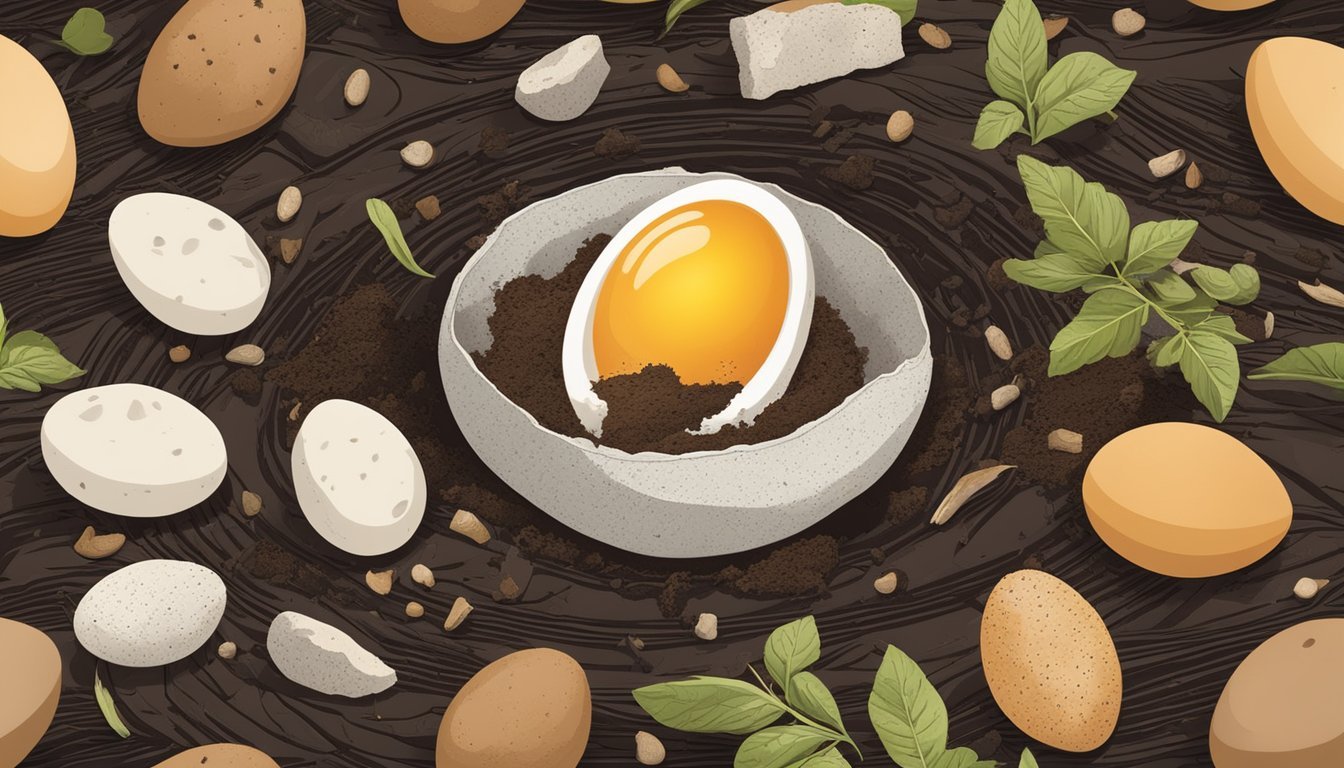Can You Compost a Whole Egg?
Unveiling the Truth About Egg Composting
Composting is a widely adopted sustainable practice that transforms organic waste into nutrient-rich soil amendments. While many are aware of the common compostable items like fruit peels, coffee grounds, and garden clippings, the question of composting whole eggs is less straightforward. It is possible to compost whole eggs, but it requires the right approach to prevent common issues such as odors and pest attraction.
In a compost pile, the key to successfully breaking down whole eggs is managing the balance between greens and browns, the moisture level, and ensuring adequate aeration. Crushed eggshells can be beneficial as they add calcium to the compost, which in turn benefits the soil. However, the inner contents of eggs, particularly if added in large quantities, can lead to unwanted smells and critters if not managed correctly.
For those looking to compost whole eggs, it is advisable to do so sparingly and within a properly managed system. Specialized composting bins like a bokashi bin or a well-maintained hot compost pile can handle eggs more effectively than a standard backyard pile. By being mindful of these considerations, composters can include whole eggs in their composting efforts without compromising the compost quality or the surrounding environment.
Basics of Composting
In the realm of organic waste management, composting stands out as a transformative process that converts various organic materials into nutrient-rich soil amendments, beneficial for garden soil and overall soil health.
Understanding Composting
Composting is a controlled, natural process where microorganisms break down organic matter—like leaves, vegetable scraps, and even whole eggs—into a stable, soil-like substance. The fundamental components for successful composting are carbon, nitrogen, oxygen, and moisture, which fuel microbial activity necessary for decomposition.
Components of a Compost Pile
Carbon-rich materials (browns): Provide energy for microorganisms; examples include dried leaves, branches, and cardboard.
Nitrogen-rich materials (greens): Serve as a protein source for microbes; examples encompass food scraps, lawn clippings, and coffee grounds.
Benefits of Composting
Composting enriches the soil, helping to retain moisture and suppress plant diseases and pests. It also reduces methane emissions from landfills and lowers your carbon footprint, making it an eco-friendly practice.
Composting Methods
Hot composting: Generates higher temperatures to hasten decomposition and kill pathogens and weed seeds.
Cold composting: Decomposes at a slower pace, often used for backyard composting.
Bokashi composting: An anaerobic process that ferments organic waste.
Vermicomposting: Utilizes worms to break down organic matter.
Tumbling compost bins: Facilitate aeration through turning.
Regulating Compost Conditions
Maintaining the right carbon-to-nitrogen ratio (ideally 30:1), moisture, temperature, and aeration is crucial to control odors, pests, and the composting process efficiency.
Composting Challenges
Common challenges include managing odors, deterring pests and rodents, and preventing the growth of pathogens which could be harmful if not properly mitigated through adequate composting practices.
EPA Guidelines on Composting
The EPA provides environmental guidelines for composting to ensure safe and effective organic waste management. These include suggestions on what should not be composted, such as meat and dairy, to avoid attracting pests and preventing disease.
Misconceptions in Composting
It is a misconception that only plant-based materials can be composted. When processed correctly, even items like whole eggs can be composted, although it's important to manage them correctly to prevent issues like odor and pests.
Determining Compost Readiness
Compost maturity can be gauged by its dark color, crumbly texture, and earthy smell. The original organic materials should no longer be recognizable.
Use of Finished Compost
Finished compost can be used as a fertilizer, mixed into garden soil, or used as mulch. It is full of nutrients that improve soil health and plant growth.
Environmental Impact of Composting
Composting reduces landfill waste, cuts greenhouse gas emissions, and transforms organic waste into valuable soil amendments, thus directly benefiting nature and minimizing the environmental impact.
Local Composting Regulations
Many municipalities have specific guidelines for backyard and community composting to comply with local health and safety regulations. It's essential to be aware of these to practice composting within legal bounds.
Adding Eggs to Compost
Composting eggs can provide valuable nutrients to your compost pile, but it requires specific techniques to prevent issues such as odor and pest attraction.
Can You Compost Whole Eggs?
While whole eggs can technically be incorporated into compost, they decompose slowly and can attract unwanted pests. It's advisable to crack them to accelerate decomposition and ensure the nutrients inside benefit the compost mix.
Composting Cooked Versus Raw Eggs
Composting cooked eggs is not recommended due to the additional fats and oils that can disrupt the balance of your compost and attract pests. In contrast, raw eggs can be composted, but care should be taken to prevent salmonella contamination and pest infestation.
Proper Egg Composting Techniques
To effectively compost eggs, one should crush and rinse the contents to reduce the risk of salmonella and to aid in quicker decomposition. It is also beneficial to bury the eggs deep within the compost to deter pests.
Hazards of Egg Composting
The primary hazards of composting eggs consist of unpleasant odors, the development of pathogens like salmonella bacteria, and attracting pests and rodents such as raccoons and rats.
Odor Management With Egg Composting
Managing odor when composting eggs involves covering them with carbon-rich materials such as sawdust, which helps absorb the smell and balances the compost's nitrogen ratio.
Avoiding Attraction of Pests and Rodents
Reduce the likelihood of critters raiding your compost by thoroughly mixing eggs with other compost materials, ensuring not to leave them exposed. Additionally, use a compost bin with a secure lid to evade pests like raccoons, rats, slugs, and snails.
Best Practices for Adding Eggs to Compost
Best practices for adding eggs to compost include using a hot composting method or a Bokashi bin to break down the eggs faster and prevent problems. It's also recommended to add crushed eggshells separately as they offer calcium without the risks associated with whole eggs.
Eggshells Versus Whole Eggs in Composting
Crushed eggshells are beneficial for composting as they provide calcium carbonate, which helps build strong cell walls in plants. They are preferable over whole eggs as they break down more quickly, do not usually produce bad odors, and do not attract pests if properly prepared - by rinsing and crushing them before adding to the pile.
Nutritional Benefits of Eggs in Compost
Incorporating whole eggs into compost provides a rich source of essential nutrients that are beneficial for soil health. They introduce vital minerals and help balance the carbon-to-nitrogen ratio, which is crucial for efficient composting.
Eggs as a Source of Calcium
Whole eggs, especially the eggshells, are an excellent source of calcium in the form of calcium carbonate. When decomposed, the calcium from eggshells is released into the compost, contributing to the nutritional profile of the resulting fertilizer. Plants require calcium for normal cell growth and health, making egg-enriched compost a valuable additive for garden soil.
NPK Values and Eggs
Eggs contribute to the NPK (nitrogen, phosphorus, potassium) values of the compost, with eggshells primarily providing calcium and trace amounts of phosphorus and potassium. As eggs decompose, they release these essential nutrients:
Nitrogen: Crucial for leaf and stem growth.
Phosphorus: Important for root development and flower/fruit maturation.
Potassium: Helps with overall plant health and disease resistance.
Boosting Microbial Activity With Eggs
Microbial activity is vital for the breakdown of organic matter into rich fertilizer. Proteins and fats within whole eggs can serve as food sources for bacteria and microbes in the compost pile, accelerating the decomposition process. However, care should be taken to prevent an excess that could lead to odor issues or attract pests.
Egg Contribution to Soil Health
When eggs are composted, they enrich the soil with organic matter, improving its structure and water retention ability. The nutrients from eggs help create a more balanced and nutritious fertilizer, enhancing the growth and health of plants.
Incorporating Eggs for Balanced Composting
Adding eggs to a compost pile should be done in moderation to maintain a proper carbon-to-nitrogen ratio. The organic materials in eggs help increase the nitrogen content, while brown materials such as leaves and branches provide carbon. A balance between these elements is essential for successful composting and avoiding issues like unpleasant odors or the germination of weed seeds.
Remember to crush the eggshells for quicker integration and to bury the eggs well within the compost pile to deter pests.
Advanced Composting Strategies
By integrating specific techniques, composters can successfully include whole eggs and eggshells into their organic waste recycling regimens while mitigating potential issues such as odor and pests.
Composting Eggshells in Bokashi Systems
Bokashi composting is a method that involves fermentation in a sealed container, making it suitable for composting eggshells. The anaerobic process encourages beneficial microorganisms that speed up the breakdown of organic waste, including eggshells. Key steps in this method include crushing the eggshells, adding them to the Bokashi bin, and sprinkling Bokashi bran to facilitate fermentation.
Vermicomposting With Eggs
In vermicomposting, worms break down organic waste, and while whole raw eggs may cause problems, controlled amounts of crushed eggshells can be included. The eggshells provide calcium, which benefits the worms' digestion process. Still, it's crucial to monitor the moisture level and pH levels within the bin when introducing eggshells to ensure a balanced environment for the microorganisms.
Hot Composting Eggs and Eggshells
Hot composting accelerates decomposition through high temperatures, which can help reduce the risk of odor from whole eggs and facilitate the breakdown of eggshells. Composters should maintain a temperature between 135°F and 160°F and balance their compost pile with a mix of green and brown materials, like fruit peels and dry leaves, to ensure a rich nutrient mix and efficient decomposition.
Troubleshooting Composting Issues
Odor management and pest control are crucial in composting eggs. Should issues arise, assess the compost's moisture level, turn it to enhance aeration, and adjust the ratio of green to brown material. If pests become a problem, ensure the compost pile is correctly sealed and consider burying eggshells deeper within the compost.
Alternatives to Composting Eggs
If composting whole eggs isn't feasible, consider alternative uses such as feeding them to animals where appropriate or using crushed eggshells as a calcium-rich addition to garden soil. It's essential to weigh the benefits against potential compost maturity delays when deciding whether to compost eggs.
By incorporating these strategies, composters can optimize their composting process and enrich their gardens while adhering to sustainable practices.



